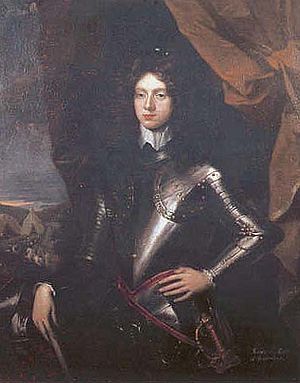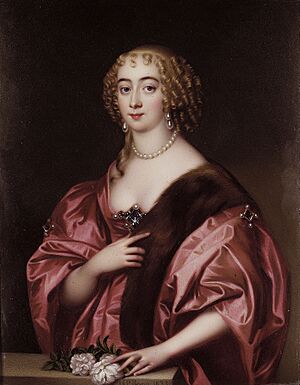Henry Spencer, 1st Earl of Sunderland facts for kids
Quick facts for kids
The Earl of Sunderland
|
|
|---|---|

Henry Spencer, 1st Earl of Sunderland
|
|
| Born | c. 23 November 1620 |
| Died | 20 September 1643 (aged 22) † |
| Spouse(s) | |
| Children | Lady Dorothy Spencer Robert Spencer, 2nd Earl of Sunderland Lady Penelope Spencer |
| Parent(s) | William Spencer, 2nd Baron Spencer of Wormleighton Lady Penelope Wriothesley |
Henry Spencer was an important English nobleman who lived a long time ago. He was known as the 1st Earl of Sunderland. He was born around November 23, 1620, and sadly died on September 20, 1643, when he was only 22 years old.
Before he became an Earl, people called him The Lord Spencer. He was part of the famous Spencer family. Henry Spencer was a politician and a nobleman who fought in the English Civil War. He was on the side of the King, who were called the Cavaliers.
Contents
Henry Spencer's Early Life and Education
Henry Spencer was born at a place called Althorp. His parents were William Spencer, 2nd Baron Spencer of Wormleighton and Lady Penelope Wriothesley. She was the daughter of Henry Wriothesley, 3rd Earl of Southampton.
He was baptized on November 23, 1620, at the church in Great Brington. Henry went to Magdalen College, Oxford for his education. He earned a Master of Arts degree there on August 31, 1636. Later that year, on December 19, 1636, he took over his father's title, becoming Baron Spencer.
Henry Spencer's Family Life
On July 20, 1639, Henry Spencer married Lady Dorothy Sidney. Her father was Robert Sidney, 2nd Earl of Leicester. Their wedding took place at Penshurst Place.
Many people believed that Henry and Dorothy truly loved each other. Dorothy's father was very happy about their marriage. After Henry's death, her father comforted Dorothy by reminding her of their happy life together.
Henry and Dorothy had three children:
- Lady Dorothy Spencer (born 1640, died 1670). She married George Savile, 1st Marquess of Halifax and had children.
- Robert Spencer, 2nd Earl of Sunderland (born 1641, died 1702).
- Lady Penelope Spencer (born around 1642, died 1667). She never married.
Henry Spencer's Role in the English Civil War
Henry Spencer was a soldier in the English Civil War. He fought in the Battle of Edgehill in 1642. Because of his brave actions, he was given a special honor. On June 8, 1643, he was made the 1st Earl of Sunderland. This new title cost him £3,000, which was a lot of money back then!
He continued to fight for the King. He was part of the Siege of Gloucester in August 1643.
Henry Spencer's Death
Henry Spencer sadly died during the First Battle of Newbury. This battle happened on September 20, 1643. He was only 22 years old when he was killed by a cannonball.
A historian named Clarendon wrote about him. He said Henry was a young lord with a lot of money and good judgment. Even though he didn't have a specific command in the army, he stayed close to the King out of honor. He joined the King's group as a volunteer on that day. Sadly, he was hit by a cannonball before they even began to charge.
 | May Edward Chinn |
 | Rebecca Cole |
 | Alexa Canady |
 | Dorothy Lavinia Brown |


